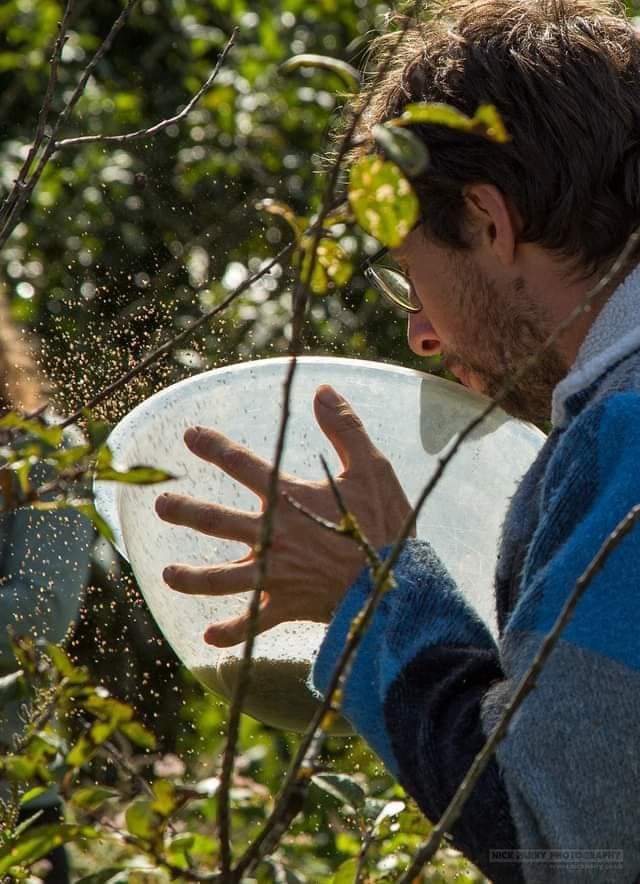WINTER/SPRING Ediculture Student Training – 2021
EDICULTURE STUDENT TRAINING – 2021
Exact Dates subject to change if required for training sessions to flow for all students –
- THEORY SESSIONS – 2 weekends at Coed rural art space, 20th – 21st Feb, and 13th – 14th March
PRACTICAL SESSIONS – Day time – 11am – 4pm on – 26th April, 3rd May, 10th May, 17th May, 24th May, 31st May, 7th June, 14th June.
A training to inspire, facilitate, and provide vital access to the practical knowledge and resources needed to forage, grow one’s own, and so build health and resilience for personal and community empowerment. Thanks to funding from community foundation wales, I am able to run these courses for a reduced cost.
Join Coed Hills resident grower and experienced permiculture specialist Stephen Watts for a New Ediculture Student Training Course.
A unique opportunity to learn about the theory and practice of Edible culture and self-sufficient growing. Covering topics such as wild food, growing, peraculture, nutrition, herbal medicine and more this course is ideal for people interested in growing their own food and increasing self sufficiency, working with community groups or learning about planning and structure of alotments or a special interest in nutrition, herbal and medicine or community living. An excellent way to improve health and wellbeing and increase your connection with nature.
CORE VISION
The Ediculture team will work with 15 people in passing on the theory and practical knowledge of Edible culture (ediculture), as outlined in the 8 phases of Ediculture. These 8 phases follow the natural learning cycle of ediculture (outlined in detail below).
Through completing all aspects of the training, each student will essentially receive an Ediculture qualification, giving them not only a personal sense of achievement in basic ediculture skills, but also a foundation in edible cultural skills, from foraging, to growing to cooking, to working with others. This basic training in the core 8 phases of ediculture can also open up lifelong inspiration to any one of the 8 areas of study, as well as open up the possibilities for many work opportunities into the future, where downscaling and re-localising food production become a necessity.
CORE OUTLINE OF THE COURSE 2021
- 8 theory sessions (January till March) – 2 hour evening classes one day a week, followed by
- 8 practical sessions (April till June) – following up by theory sessions one full day a week with applied practical in each of the 8 core ● help and advice on designing growing spaces (allotments, back-gardens, etc)
● work with community growing groups
● find greater direction and clarity post education/or mid career.
FEES FOR THE COURSE
SIGN UP OPTIONS
- FREE – in exchange for 4 VOLUNTEER DAYS in the garden. (Recommended for added learning skills through volunteering)
- SINGLE PAYMENT OF £100 FOR FULL COURSE
- PAYMENT BY SESSION – £10 PER SESSION (£160 IN FULL)
Details for volunteering –
- The students can choose when they would like to offer the volunteer days, provided it is within the time period 21st March – 21st
- The students must communicate in advance what days they would like to attend. (Must be during the week, preferably Monday – Wednesday)
- If these 4 work days cannot be attended then a financial exchange instead can be arranged. (10£ a session)
- Travel costs to Coed can be covered for all work days. Travel cost can be covered for attending the teaching sessions as well.
The intention of this 2021 course is to –
- Learn and practice the basic skills needed to increase one’s own personal self-sufficiency
- Give people basic skills in passing on the ediculture framework (8 phases) to others
- Offer the possibility to make this a choice in sustainable career paths
Required attributes to attend the course –
- Have at least 1 year experience in a garden and/or basic foraging knowledge
- Have a passion for nature and learning
- Enjoy working with others
- Be keen on the possibility of this training opening up a career path
Desirable attributes but not essential –
- Have some experience and/or knowledge of herbs and nutrition
- Have experience in organisation, planning and meeting deadlines.
Ediculture Qualification –
- For full completion of the training and so gaining ediculture qualification students must –
- attend all sessions
- develop curiosity, passion and engagement
- show understanding of the ediculture cycle
- Demonstrate achievement in practical application of the subject.
TO APPLY
Anyone interested in attending the course must contact Stephen via phone or email to book your place.
First come first served basis. Applications are open until the course is fully booked.
07507578885
Ediculture@gmail.com
LOCATION
Coed Hills gardens
St Hilary
CF717DP

